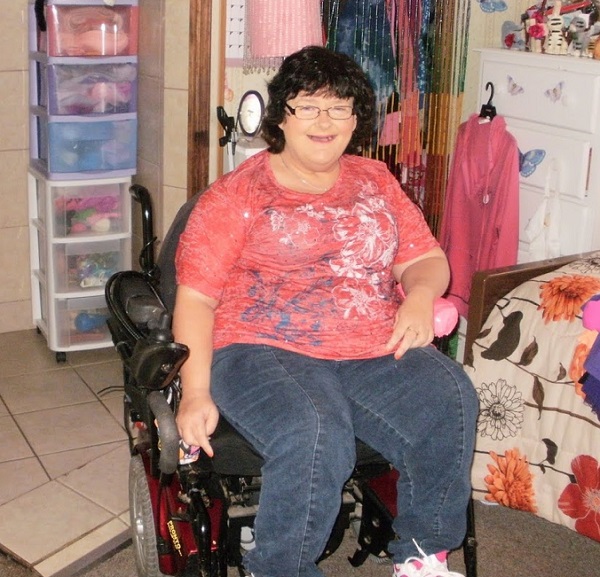
I once posed for a photojournalist in Chicago whose assignment was to take pictures of women who were “differently abled.”
One of the photos required me to be tied to my wheelchair with a rope, hands behind my back, submissively looking at the camera.
He called this picture “Wheelchair-Bound.”
While meant as a nod to sexual expression, I realized how being tied to my wheelchair was an accurate depiction of what most people imagine when they think of the phrase “wheelchair-bound.” It’s a phrase that’s nonchalantly tossed around as a way to signify that someone is in a wheelchair.
Those who are not disabled may find it hard to associate a wheelchair with anything optimistic. There’s a sense of apprehension about a wheelchair factoring into their daily lives.
Growing up, I recall how people in wheelchairs were forever shown in movies and telenovelas as either disgraceful, unpleasant, self-loathing people whose only purpose in life was to walk again, or as the villains of a story who end up in a wheelchair as the worst possible outcome of their individual actions. This perpetuated the flawed expectation that people in wheelchairs are either hostile cripples or horrible people who need to be punished with a life sentence—expectations that are, more frequently than not, far-removed from reality.
What I’m hoping to do here is help portray the incapacitated form in an optimistic light and defy the labels enforced upon us by society.
Wheelchair-bound is an oxymoron.
My wheelchair is sexy. It is a part of how I move and how I share myself with the world. To call myself “wheelchair-bound” would not be representative of how I see myself as a woman with a disability—unique, with dancing wheels. To call a wheelchair user “wheelchair-bound” is an oxymoron since the whole purpose of a wheelchair is to offer mobility and independence.
Still, I know there are those who will not necessarily understand this concept, and that also includes some wheelchair users whose relationship with their wheels has not yet reached the love affair stage. Is there such a thing? I think so. I really do believe that those of us who reach a point of self-acceptance and positive body image will eventually develop a loving relationship with our wheelchairs.
There is nothing more depressing for wheelchair users than experiencing the absence of our wheels. When our wheelchair breaks down is when we truly are “bound,” imprisoned, limited, and confined. Society continues to suggest that people with physical disabilities should envision themselves able-bodied in order to be “whole.” Through my own quest for positive self-identity, I have learned that it is important to be able to imagine ourselves the way we dream of being without necessarily changing the disabled aspects of who we are.
No matter what our disability may be, there has been a time in our lives when we have either wished we were not disabled or wondered what life would be like as an able-bodied person. While I think such feelings are part of the process of adapting to the permanence of disability, socially unrealistic expectations of beauty feed the monster of ableism which discourages having a positive view of ourselves in our disabled bodies. Our personal journey toward self-identity has to include being able to envision ourselves powerful, sexy, and desirable without negating our right to claim our differences as positive aspects of who we are.
“Wheelchair-bound” is not a positive term for our sexy selves.
Positive body image stems from our ability to find our own way of reconciling with our bodies. Words and thoughts are powerful conductors of energy. We must take a look at the way we refer to our bodies and the language we use to refer to ourselves.
Do we call ourselves demeaning names or use language that implies pity or shame as it relates to our bodies or aspects of our disabilities? Do we ridicule our appearance or make statements that suggest we are inferior to able-bodied people? Do we settle for definitions that suggest we are inferior, imprisoned, or unworthy? Do we ever speak about our bodies with love?
Changing the language we use to refer to ourselves and our disabilities from negative to empowering is important because doing so will also change the way other people refer to us and relate to us. I challenge each of us to peel off the labels we have been forced to wear through terms like “wheelchair-bound” and other negative language that’s been adopted by the cultural evolution of political correctness.
I challenge each of us to redefine disability through the power of love. And for those in wheelchairs, I challenge you to reframe your wheelchair’s purpose from confining and binding to the soaring spirit it is capable of becoming. I challenge you to feel the wind beneath your wheels.
“Wheelchair-bound” is not something that accurately defines people in wheelchairs; it instead defines how we are viewed through the lens of fear-driven myths that imprison us.
If you are a wheelchair user who embraces the term “wheelchair-bound,” may it be because you are into kinky sexual expression, and purposely and willingly chose to be tied up to your chair to share the best of your sensuality with a lover. May you remember that even then, you are still in control of your life and your wheels, knowing full well that wheelchairs are not binding.
They are liberating. They are empowering. They are sexy!
Share your thoughts below.
~
Author: Sandy Pennington
Image: Author’s Own
Editor: Nicole Cameron


 Share on bsky
Share on bsky




Read 0 comments and reply